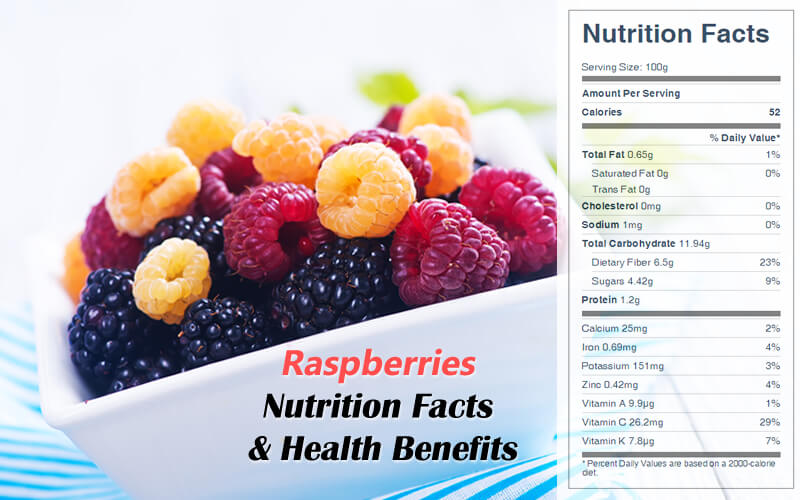Raw Raspberries Nutrition Facts & Health Benefits
Raspberries are widely grown in all temperate regions of the world. There are red, purple, black, and yellow varieties of raspberries, little fruit has true superfood benefits. Its positive effects on immunity come in part from being so rich in vitamins and minerals, here are nutrition facts & health benefits of raspberries.

Raw raspberries are 86% water, 12% carbohydrates, they are a rich source of vitamin C, manganese and dietary fiber, and e a low-glycemic index food. (click here to learn more about high and low glycemic index foods)
This tart, delectable fruit supplies not only a fair amount of vitamin C, but useful amounts of calcium, potassium, iron, and magnesium, which are all vital to the convalescent, as well as to those suffering from heart problems, fatigue, or depression. All of the minerals are well absorbed, thanks to the vitamin C.
Raspberries (Fresh) Nutrition Facts Label
Health Benefits of Raspberries
Raspberries have several essential micronutrients, fibers, and polyphenols.
Because raspberries are aggregate fruits, made up of many small beads of fruit, each containing a seed, they are very high in fiber. Raspberries are one the highest whole food sources of dietary fiber, providing 6.5 grams per 100 gram serving! (why we need dietary fiber? click here)
Raspberries are frequently studied for their health effects, because they are a significant source of anthocyanins, antioxidants, and phytochemicals. Raspberries are one of the few berries with the potential to inhibit the formation of cancer tumors, according to experiments involving human subjects. Raspberries contain ellagic acid, quercetin, and kaempferol, as well as anthocyanins. They have an ORAC of 4882, one of the highest among rated foods.
The polyphenol content in raspberries is dominated by anthocyanin and ellagitannin. Anthocyanins give raspberries their antiinflammatory benefits, with the total amount of anthocyanins increasing during the ripening process. Anthocyanins are what give raspberries their distinct color, so this is a good indicator of the content.
The ellagitannin content in raspberries represents close to 60% of its antioxidant capacity. Combine this with the antioxidant potential of anthocyanins and you can understand the abundance of antioxidant benefits of raspberries! This antioxidant capacity is what researchers have found to decrease cancer and diseases associated with aging. Eat your raspberries ripe to get the greatest combination of antioxidant capacity.
Naturally astringent, raspberries can do you good the length of your digestive tract, helping to counter spongy, diseased gums, upset stomachs, and diarrhea along the way.
Raspberries also contain quercetin, a potent antioxidant that has demonstrated benefits against viruses. Studies have shown that quercetin can chelate zinc ions and act as a zinc ionophore, which means it draws zinc into the cell where it has antiviral activity against RNA viruses. Studies also have found significant increases in Bifidobacterium by consuming raspberries, which is one of the most important bacterial species to support our immune system.
Red raspberries have also been shown to change the diversity of the gut microbiota. These dietary phenols have a prebiotic effect in the gut, increasing the abundance of good bacteria. One study found an increase in Roseburia, which produces the short-chain fatty acid butyrate that feeds our microbiota.
Health Tips
Choose berries that are not leaking juice. If there are signs of mold, pick out and discard the moldy berries before storing the rest.
Don’t wash them until you are ready to eat them, store unwashed berries in the refrigerator and then eat them within a day or two.
Don't try to keep them at room temperature, for they will spoil very quickly. Fresh raspberries are highly perishable, subject to bruising and mold as well as simply not having a very long shelf life, and eat them promptly!